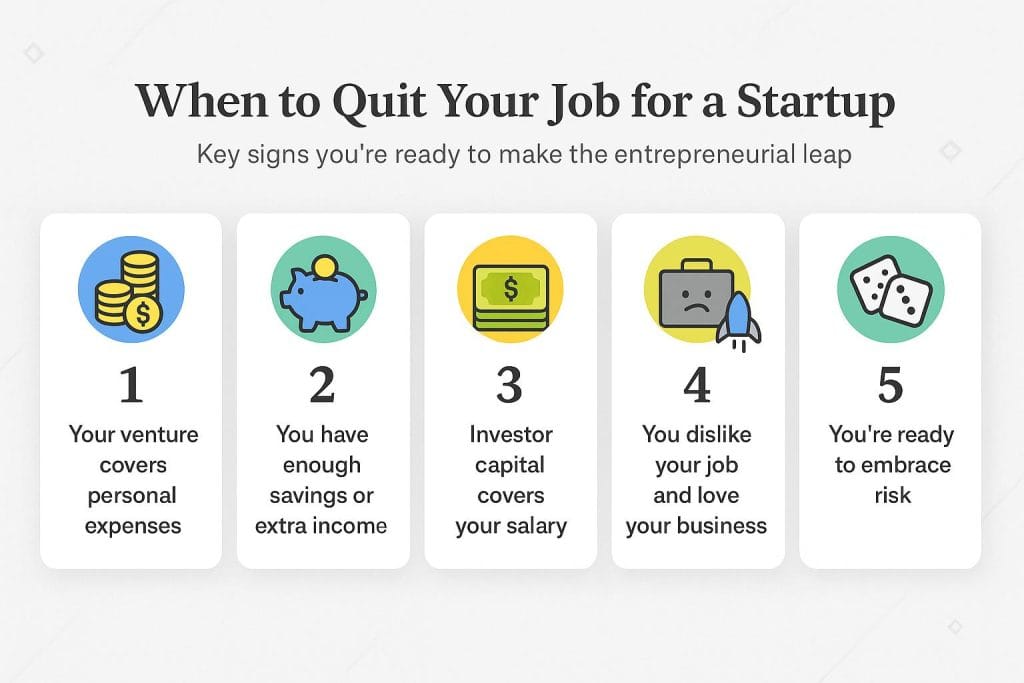How to quit your job for a startup
Employees quit jobs for numerous reasons. However, leaving a secure career behind to launch your own business is a dream for many professionals, and doing it right is crucial. Before plunging headfirst into your startup venture, create a plan and set yourself up for entrepreneurial success by following these five best practices.
- Start a side hustle before quitting your job
- Map out your finances
- Craft a business plan
- Network with people in your industry
- Don't wait for the "right time"
1. Start a side hustle before quitting your job.
Starting your business as a side project while keeping your full-time job gives you the best of both worlds: financial stability and proof of concept. It lets you test your business model, learn your market and build early momentum without the pressure to be profitable right away.
Gene Caballero, co-founder of GreenPal, which bills itself as “Uber for lawn care,” was a corporate sales coach for Dell when he first founded his company. At the time, he worked from 7 a.m. to 10 p.m. Monday through Friday, 8 a.m. to 5 p.m. Saturdays, and 10 a.m. to 4 p.m. Sundays. Although he had limited free time, pursuing his side hustle better prepared him to commit fully.
“The courage to take the leap was not as bad … since I was doing both and was able to see our growth along the way,” Caballero explained. “When the numbers made financial sense — able to pay half of my bills — that is when I made the leap. Yes, it was still scary to leave a great job for something that was not guaranteed, but it’s hard to change an industry working part-time.”
Having that entrepreneurial experience while working a day job makes the risk less daunting. You still have the safety net of a career, but you can also gauge the potential success of your startup before going all in.
According to
Bankrate's 2025 Side Hustles Survey, 27 percent of U.S. adults have a side hustle, down from 36 percent in 2024. Those with one earn an average of $885 per month, slightly below the 2024 average of $891. Millennials continue to lead all generations in participation.
2. Map out your finances.
One of the biggest risks of quitting a well-paying job to pursue your business idea is running out of money. That’s why you need a solid financial plan, including savings and startup funding, to support your venture and cover overhead costs before making any big moves.
While it might be tempting to hand in your two weeks’ notice and chase a career that excites you, jumping in too quickly can jeopardize your long-term success.
“A lot of people will tell you to quit your day job for your startup simply because you’re passionate about it,” said Deborah Sweeney, founder of MyCorporation.com. “But it’s far more important to be practical and prepared when taking your side hustle full-time. You should be financially prepared to make the leap, with a nest egg set aside in savings in case of an emergency.”
Before taking the leap, aim to save 12 to 18 months of personal and business expenses. This financial cushion can help you cover your living costs, fund startup operations, and handle unexpected challenges while giving your business the runway it needs to become profitable.
3. Craft a business plan.
Don’t go into your new business blind. To give your new venture the best chance of success, you must design and write a business plan that considers how you’ll reach your target audience, gauge the competition, find investors and more.
“The business plan should be detailed, with an understanding of what your business is and does, your target audience, where you are at in your development stages, your competitors, projected profits and losses, and if you will require funding from investors,” advised Sweeney. “If you have not already legitimized your company, now is the time to take care of those technical details like incorporating or forming an LLC, registering for trademarks, filing business licenses, and registering for DBAs and EINs.”
Today’s business plans don’t have to be long to be effective. Many entrepreneurs now prefer concise formats, like one-page business plans or lean canvas models, that highlight key goals, metrics and strategies while allowing room to adapt quickly as the business grows.
“Unless you need to raise money from investors, don’t bother with writing a 20-plus-page business plan,” recommended Stephie Althouse, Ph.D. and CEO of Top-Notch CEO. “Instead, write a short, pragmatic one.”
Althouse said this short-form business plan should outline your vision, mission (business purpose), business goals (large and small), strategies to achieve them and a 90-day action plan.
4. Network with people in your industry.
In the business world, it’s all about who you know. It doesn’t matter how talented or passionate you are if you aren’t willing to connect with people in your industry. Start building connections before you quit your job; the relationships you form now can become future customers, mentors, strategic partners or investors who help your startup grow faster. Networking successfully includes connecting with customers and other business owners, and without it, you won’t have nearly as much success.
“Networking and marketing are key — and they are as important as what you might think of as core skills for your business,” Althouse noted. “For example, if you are an engineer and you want to open an engineering firm, of course, you need to be great at engineering. However, you need to be or get good at marketing and client acquisition — or hire someone who is. [Otherwise] your business endeavor will not be successful.”
To create a small business
marketing plan, you'll need to understand your business goals, how to quantify and measure success, and how to implement the strategies that will lead to success.
5. Don’t wait for the “right time.”
There are many risks in entrepreneurship. But if every business owner cowered in the face of uncertainty, the business world would be nonexistent.
“If you’re worried about the risk [of] going on your own, remember that working a steady job is just as risky,” said Boyechko. “At a moment’s notice, you could lose your job, and there is no guarantee you’ll find a similar position. When you’re working for yourself, even when money is tight, you have the ability to do something about it rather than wait for a new job to come along.”
You might consistently tell yourself you’re not ready yet — that it’s not the “right time.” But it might never feel like the perfect time to leave a secure job position to start your own business; you can’t let that dissuade you from an opportunity.
Many entrepreneurs wait for a flawless business plan or a working prototype before making the plunge. However, time is incredibly more limited and finite than money. Once it’s gone, you can’t get it back.
If you have a solid idea and strong distribution skills, risk-taking ability and a pragmatic way to support your expenses, it may be time to focus on your startup full-time. You might never get a second chance.
When to quit your job for a startup
Timing is everything when transitioning from a reliable — but boring, toxic or unfulfilling — job with a robust employee benefits package to your own venture. Consider the following scenarios that may indicate it’s time to pursue your entrepreneurial dreams:
1. Your new venture is generating enough money.
Once your side hustle generates enough profit (not revenue) to financially sustain its operations and your personal costs, you can safely make the transition. Financial advisors typically recommend that your business consistently generate at least 75 percent of your current salary for three to six months before making the leap. This demonstrates sustainable revenue rather than one-time windfalls.
Assess your living costs, including mortgage or rent, utilities, insurance, food, auto and transportation expenses, clothing, etc. Add some cushion for unexpected expenses like car repairs or medical bills. If other expenses are nonnegotiable in your lifestyle — travel, restaurants or entertainment — factor them in.
2. You have enough savings or other income sources.
If you have adequate savings to rely on while you work on your new business, consider making the move. Understand that you must be willing to deplete this rainy-day fund and that it may take longer than anticipated to boost your company’s revenue and profits.
Alternatively, you may have enough income from a spouse’s salary, investment income or rental property income to allow you to make the jump. It is likely you’ll need to tighten your belt and cut expenses until your startup’s profits can replace your job income.
3. Your company has investment capital that will pay your salary.
You may have built a salary into your business plan’s pro forma income statement under expenses and found an angel investor who agrees to your terms to help fund your company.
According to the National Venture Capital Association, U.S. VC firms closed about 14,320 deals worth $215.4 billion in 2024, with many founders allocating reasonable salaries from these investments to sustain themselves while building their companies. The idea is that, as the founder, it will benefit the company and its owners for you to devote your attention to it full-time. In this case, quitting the job for your startup makes sense.
4. You hate your job and love your business.
In addition to practical financial considerations, you may be ready to make a switch if you are very unhappy in your job and feel passionately about your business venture. As long as you can financially get by, it will be worth it to rid yourself of employee burnout and a toxic workplace culture to become your own boss. Once you make the change, you can devote all your effort and planning to making your business dream a reality.
5. You are not risk-averse.
If you like to play it safe and are resistant to change, keeping your 9-to-5 job and working on your business in your free time until it can support itself and you is likely the right plan. However, if you’re a risk-taker willing to work long hours and make financial sacrifices while building your business, you may find that quitting your job is the best decision.
Owning your own business gives you a path to a much higher potential income and provides the freedom to make your own decisions, see your plans come to life, and build an asset you may be able to sell in the future.
At some point, you may want to
value your business to sell it or take on new investors. In this case, your buyer or investors must accept your valuation and agree to terms, restrictions and timing.












